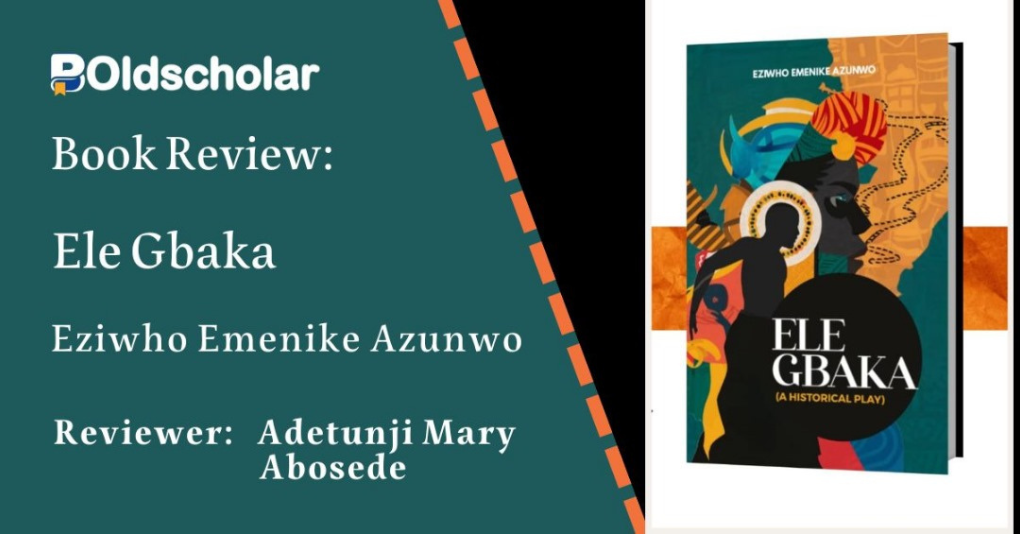Work Title: Ele Gbaka
Author: Eziwho Emenike Azunwo
Reviewer: Adetunji Mary Abosede
Publisher: Emu Integrated Services Ltd.
Pagination (number of pages) 49 pages
Year of Publication: 2024
Institution: Rivers State University, Port Harcourt
Department of Theatre and Film studies.
Introduction
Ele Gbaka by Eziwho Emenike Azunwo is a compelling drama that delves into the heart of cultural identity, leadership, and moral resilience within a traditional African community. Set against the backdrop of the Rundele people, the play masterfully weaves a narrative that is both reflective and critical, examining the tension between time-honored traditions and the evolving dynamics of modernity and ambition. Through its rich characters and thought-provoking plot, the drama offers a profound commentary on the struggles and triumphs of a community navigating change.
This review seeks to unpack the layers of Ele Gbaka, exploring its themes, character development, and the significance of its message in today's sociocultural context. By analyzing the intricacies of the narrative and the roles of its key players, this critique aims to highlight the drama’s artistic and moral contributions, underscoring its relevance as a literary work that resonates deeply with universal human experiences.
Author's Bibliography
Eziwho Emenike Azunwo is a distinguished playwright, poet, and scholar known for his insightful contributions to African literature. His works often explore themes of identity, culture, and the socio-political dynamics of African societies. Some notable works by Azunwo include The Echoes of Silence, Voices from the Past, Shadows of the Ancestors.
Azunwo continues to inspire readers and audiences alike with his thought-provoking explorations of African heritage and contemporary issues. His plays are not only literary works but also cultural commentaries that encourage dialogue and reflection on the complexities of identity in a changing world.
Plot Overview
The drama Ele Gbaka by Eziwho Emenike Azunwo revolves around the intricate interplay of tradition, leadership, and morality within the Rundele community. The plot unfolds in the fictional setting of a culturally rich community grappling with challenges to its values and identity. At its heart, the drama portrays the tension between age-old customs and the forces of modernity and personal ambition. The title Ele Gbaka, loosely translated as "The Heart of the Matter," sets the tone for a narrative deeply embedded in the moral and spiritual struggles of the characters.
The story begins with Ndele, a respected elder, who embodies wisdom and integrity. His role as a moral compass becomes evident when disputes arise in the community over leadership succession. Uvuawhu, an ambitious and cunning individual, seeks to disrupt the established order by manipulating others to gain power. The conflict escalates as Uvuawhu's actions begin to unravel the community's unity, exposing the fragility of its traditions in the face of personal greed and external pressures.
Emohua, a young and idealistic member of the community, emerges as a foil to Uvuawhu. He represents the youth’s yearning for progress but remains deeply rooted in the values of respect and honor handed down by the elders. His journey through the narrative reflects the struggle of balancing the old and the new. Guided by Ndele’s counsel, Emohua becomes a unifying figure, striving to restore harmony and reestablish trust among the community members. This is contrasted with Womehoma and Awute, whose roles serve to highlight the diverse perspectives within the community on the path forward.
The drama crescendos in a climactic confrontation where the true essence of leadership is tested. The resolution of the conflict brings with it a powerful message about the importance of upholding communal values and the perils of self-serving ambition. Through its compelling characters and thought-provoking narrative, Ele Gbaka delves into themes of morality, leadership, and the resilience of cultural identity, leaving readers with a profound appreciation of the complexities of community life.
Character Development
The characters in Ele Gbaka by Eziwho Emenike Azunwo are crafted with depth and complexity, reflecting the moral and social dynamics of the Rundele community. Each character undergoes significant development throughout the drama, making them pivotal to the narrative's themes of leadership, tradition, and morality. Their growth is intricately tied to the events of the plot, illustrating their struggles, choices, and eventual transformations.
Ndele, the elder statesman, begins as a steadfast guardian of the community's values. His wisdom and experience are evident in his measured approach to conflicts, but his patience is tested as the drama unfolds. Ndele's character development lies in his growing realization that mere adherence to tradition is not enough; he must actively inspire and guide the younger generation to preserve their cultural heritage. His journey is one of renewed purpose, as he moves from being a passive observer to an active participant in shaping the community's future.
Uvuawhu, on the other hand, embodies the darker side of ambition. Initially charismatic and seemingly well-intentioned, his true colors emerge as he manipulates others to achieve his goals. Uvuawhu’s descent into selfishness and deceit is starkly contrasted with his initial portrayal, making his downfall a poignant lesson in the consequences of unchecked ambition. His development, or rather, his unraveling serves as a cautionary tale about the dangers of prioritizing personal gain over communal well-being.
Emohua, the idealistic youth, evolves from a somewhat naive character into a mature and resolute leader. His initial enthusiasm for progress sometimes blinds him to the importance of tradition, but as the drama progresses, he learns to balance the old with the new. Guided by Ndele and the trials he faces, Emohua grows into a figure of hope and unity. His development symbolizes the potential for the younger generation to lead with integrity while honoring their roots.
Supporting characters like Womehoma and Awute also undergo meaningful growth. Womehoma begins as a skeptic of Emohua's vision but later becomes an ally, illustrating the power of trust and understanding. Awute, on the other hand, struggles with personal dilemmas that mirror the broader conflicts in the community. Together, their development enriches the narrative, highlighting the diverse ways individuals can contribute to or hinder communal progress. Through these character arcs, Ele Gbaka presents a layered exploration of human nature and the intricate ties between personal growth and societal harmony.
Themes
Identity and Resilience
At the heart of Ele Gbaka are the themes of identity and resilience. Azunwo emphasizes the importance of understanding one's roots in the face of external challenges, highlighting how cultural identity shapes individual and communal experiences. The struggle for identity is portrayed as a dynamic process, influenced by historical events, personal choices, and societal pressures. Throughout the play, characters grapple with their sense of self, often questioning what it means to belong to a culture that is being threatened by outside forces.
The theme of resilience is particularly poignant in the face of adversity. Azunwo illustrates how the characters draw strength from their cultural heritage and community bonds, allowing them to withstand the pressures of colonialism. The play showcases moments of solidarity and collective action, highlighting the importance of community in navigating challenges. Characters come together to support one another, reinforcing the idea that resilience is not merely an individual trait but a collective endeavor. This theme resonates deeply with audiences, as it speaks to the universal human capacity to endure and thrive despite hardships.
Moreover, Azunwo's exploration of identity and resilience encourages audiences to reflect on their own lives and the historical narratives that shape their identities. In a world where globalization often threatens cultural diversity, the play serves as a reminder of the significance of cultural heritage and the need to preserve it. The characters’ journeys of self-discovery resonate with anyone who has grappled with questions of identity, making Ele Gbaka a timeless exploration of the human experience.
Cultural Heritage and Its Significance
The significance of cultural heritage is another key theme in Ele Gbaka. Azunwo underscores the necessity of preserving cultural narratives and practices as a means of fostering community and identity. Through the characters' struggles and triumphs, the play illustrates the richness of African traditions and the importance of passing these legacies down through generations. The elders in the play serve as custodians of this heritage, reminding younger characters of the value of their cultural roots and the wisdom embedded in traditional practices.
Azunwo also critiques the impact of colonialism on cultural heritage, illustrating how external influences can lead to the erosion of traditional values and practices. The play presents a nuanced view of modernization, acknowledging its potential benefits while also highlighting the risks it poses to cultural identity. As characters grapple with the allure of modernity, they are reminded of the importance of maintaining a connection to their past. This tension between tradition and modernity is a central focus of the narrative, prompting audiences to consider the implications of cultural loss in their own lives.
The exploration of cultural heritage invites a broader discussion about the role of tradition in shaping contemporary identities. Azunwo's work encourages audiences to engage with their histories and consider how these narratives inform their present and future. In an age where cultural homogenization is prevalent, Ele Gbaka serves as a powerful reminder of the importance of celebrating and preserving cultural diversity. The play ultimately advocates for a balance between honoring tradition and embracing change, emphasizing that cultural heritage is not static but rather a living, evolving aspect of identity.
Societal Relevance
The societal relevance of Ele Gbaka extends beyond its historical context. In today's globalized world, issues of cultural identity and heritage remain pressing concerns. Azunwo's work serves as a reminder of the importance of preserving cultural narratives in the face of modernization and cultural homogenization. The play encourages audiences to engage in dialogues about their histories and the ways in which these histories shape their present and future. By addressing the ongoing impact of colonialism, Ele Gbaka resonates with contemporary audiences, prompting them to reflect on their own cultural identities and societal roles.
In many parts of the world, communities continue to grapple with the effects of colonialism and globalization on their cultural identities. The themes presented in Ele Gbaka are particularly relevant for individuals and communities seeking to navigate the complexities of modern life while remaining connected to their cultural roots. Azunwo's exploration of identity and resilience offers valuable insights for those striving to preserve their heritage in an increasingly interconnected world.
The play also highlights the importance of intergenerational dialogue in understanding and preserving cultural identity. By showcasing the interactions between elders and youth, Azunwo emphasizes the need for mutual respect and understanding across generations. This message is particularly relevant in contemporary society, where rapid changes can create rifts between generations. "Ele Gbaka" serves as a call to action for individuals to engage with their cultural heritage and to foster connections that transcend generational divides.
Literary Style and Techniques
Azunwo's literary style is characterized by rich imagery and emotive language, which enhances the emotional depth of the play. The dialogue is both engaging and thought-provoking, capturing the nuances of the characters' experiences. The incorporation of traditional proverbs and idiomatic expressions adds authenticity to the dialogue, grounding the narrative in its cultural context. This stylistic choice not only enriches the text but also honors the oral traditions that are integral to African storytelling. Azunwo’s use of symbolism and metaphor further deepens the play’s themes, inviting audiences to engage with the narrative on multiple levels.
The play's structure is also noteworthy, as it combines elements of traditional storytelling with modern dramatic techniques. Azunwo employs flashbacks and foreshadowing to create a layered narrative that encourages audiences to reflect on the characters' pasts and the implications for their futures. This approach allows for a deeper understanding of the characters' motivations and the historical context in which they operate. The interplay between past and present serves to highlight the continuity of cultural identity, reinforcing the idea that history is an integral part of the characters' lives.
Moreover, Azunwo's use of stage directions and visual imagery enhances the audience's experience, creating a vivid portrayal of the community and its cultural practices. The settings and actions depicted on stage serve to immerse the audience in the world of the play, allowing them to feel the weight of the characters' struggles and triumphs. This attention to detail not only enriches the narrative but also reinforces the play's themes of identity and cultural heritage, making Ele Gbaka a compelling and thought-provoking theatrical experience.
Conclusion
In conclusion, "Ele Gbaka" by Eziwho Emenike Azunwo is a powerful exploration of the intersections of history, culture, and identity. Its profound themes and well-developed characters make it a significant work within African literature. As audiences engage with the play, they are prompted to reflect on their own cultural identities and the enduring impact of historical narratives. Azunwo's contribution to literature is invaluable, fostering understanding and appreciation for the complexities of African societies. Ele Gbaka stands as a testament to the resilience of the human spirit and the importance of cultural heritage in shaping our identities.
The play's exploration of identity, resilience, and cultural heritage is not only relevant to the historical context in which it is set but also resonates with contemporary audiences grappling with similar issues. Azunwo's work encourages a deeper understanding of the complexities of cultural identity and the importance of preserving cultural narratives in a rapidly changing world. As such, Ele Gbaka serves as a vital reminder of the enduring power of storytelling in shaping our understanding of ourselves and our place in the world.
Ultimately, Ele Gbaka is more than just a historical play; it is a call to action for individuals and communities to engage with their cultural heritage and to foster connections that transcend time and space. Azunwo's masterful storytelling invites audiences to reflect on their own journeys of self-discovery and to recognize the importance of honoring their roots while embracing the future. In doing so, Ele Gbaka stands as a powerful testament to the resilience of the human spirit and the enduring significance of cultural identity.
Share this post





Be the first to comment on this post